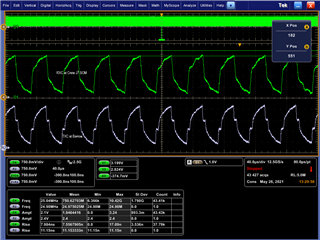Other Parts Discussed in Thread: SYSCONFIG
Our custom design connects the MCU_RGMII1 interfaces of two TDA4 SOMs directly together using a buffer chip and board-to-board connectors. The signals are crossed-over (SOM1 TX <-> SOM2 RX), and I've configured Linux for fixed-link mode:
&cpsw_port1 {
phy-mode = "rgmii";
fixed-link {
speed = <100>;
full-duplex;
};
};
And confirmed the correct pinmux:
mcu_cpsw_pins_default: mcu_cpsw_pins_default {
pinctrl-single,pins = <
J721E_WKUP_IOPAD(0x0058, PIN_OUTPUT | DRV_STR_1, 0) /* MCU_RGMII1_TX_CTL */
J721E_WKUP_IOPAD(0x005c, PIN_INPUT, 0) /* MCU_RGMII1_RX_CTL */
J721E_WKUP_IOPAD(0x0060, PIN_OUTPUT | DRV_STR_1, 0) /* MCU_RGMII1_TD3 */
J721E_WKUP_IOPAD(0x0064, PIN_OUTPUT | DRV_STR_1, 0) /* MCU_RGMII1_TD2 */
J721E_WKUP_IOPAD(0x0068, PIN_OUTPUT | DRV_STR_1, 0) /* MCU_RGMII1_TD1 */
J721E_WKUP_IOPAD(0x006c, PIN_OUTPUT | DRV_STR_1, 0) /* MCU_RGMII1_TD0 */
J721E_WKUP_IOPAD(0x0078, PIN_INPUT, 0) /* MCU_RGMII1_RD3 */
J721E_WKUP_IOPAD(0x007c, PIN_INPUT, 0) /* MCU_RGMII1_RD2 */
J721E_WKUP_IOPAD(0x0080, PIN_INPUT, 0) /* MCU_RGMII1_RD1 */
J721E_WKUP_IOPAD(0x0084, PIN_INPUT, 0) /* MCU_RGMII1_RD0 */
J721E_WKUP_IOPAD(0x0070, PIN_INPUT | DRV_STR_1, 0) /* MCU_RGMII1_TXC */
J721E_WKUP_IOPAD(0x0074, PIN_INPUT, 0) /* MCU_RGMII1_RXC */
>;
};
Output from ethtool shows that the interface is up and attempting to transmit, but is not receiving (or even dropping) packets from the remote side: (same result on from both SOMs)
NIC statistics:
p0_rx_good_frames: 47
p0_rx_broadcast_frames: 23
p0_rx_multicast_frames: 24
p0_rx_crc_errors: 0
p0_rx_oversized_frames: 0
p0_rx_undersized_frames: 0
p0_ale_drop: 0
p0_ale_overrun_drop: 0
p0_rx_octets: 10870
p0_tx_good_frames: 0
p0_tx_broadcast_frames: 0
p0_tx_multicast_frames: 0
p0_tx_octets: 0
p0_tx_64B_frames: 2
p0_tx_65_to_127B_frames: 14
p0_tx_128_to_255B_frames: 8
p0_tx_256_to_511B_frames: 23
p0_tx_512_to_1023B_frames: 0
p0_tx_1024B_frames: 0
p0_net_octets: 10870
p0_rx_bottom_fifo_drop: 0
p0_rx_port_mask_drop: 0
p0_rx_top_fifo_drop: 0
p0_ale_rate_limit_drop: 0
p0_ale_vid_ingress_drop: 0
p0_ale_da_eq_sa_drop: 0
p0_ale_block_drop: 0
p0_ale_secure_drop: 0
p0_ale_auth_drop: 0
p0_ale_unknown_ucast: 0
p0_ale_unknown_ucast_bytes: 0
p0_ale_unknown_mcast: 0
p0_ale_unknown_mcast_bytes: 0
p0_ale_unknown_bcast: 0
p0_ale_unknown_bcast_bytes: 0
p0_ale_pol_match: 0
p0_ale_pol_match_red: 0
p0_ale_pol_match_yellow: 0
p0_ale_mcast_sa_drop: 0
p0_ale_dual_vlan_drop: 0
p0_ale_len_err_drop: 0
p0_ale_ip_next_hdr_drop: 0
p0_ale_ipv4_frag_drop: 0
p0_tx_mem_protect_err: 0
p0_tx_pri0: 0
p0_tx_pri1: 0
p0_tx_pri2: 0
p0_tx_pri3: 0
p0_tx_pri4: 0
p0_tx_pri5: 0
p0_tx_pri6: 0
p0_tx_pri7: 0
p0_tx_pri0_bcnt: 0
p0_tx_pri1_bcnt: 0
p0_tx_pri2_bcnt: 0
p0_tx_pri3_bcnt: 0
p0_tx_pri4_bcnt: 0
p0_tx_pri5_bcnt: 0
p0_tx_pri6_bcnt: 0
p0_tx_pri7_bcnt: 0
p0_tx_pri0_drop: 0
p0_tx_pri1_drop: 0
p0_tx_pri2_drop: 0
p0_tx_pri3_drop: 0
p0_tx_pri4_drop: 0
p0_tx_pri5_drop: 0
p0_tx_pri6_drop: 0
p0_tx_pri7_drop: 0
p0_tx_pri0_drop_bcnt: 0
p0_tx_pri1_drop_bcnt: 0
p0_tx_pri2_drop_bcnt: 0
p0_tx_pri3_drop_bcnt: 0
p0_tx_pri4_drop_bcnt: 0
p0_tx_pri5_drop_bcnt: 0
p0_tx_pri6_drop_bcnt: 0
p0_tx_pri7_drop_bcnt: 0
rx_good_frames: 0
rx_broadcast_frames: 0
rx_multicast_frames: 0
rx_pause_frames: 0
rx_crc_errors: 0
rx_align_code_errors: 0
rx_oversized_frames: 0
rx_jabber_frames: 0
rx_undersized_frames: 0
rx_fragments: 1
ale_drop: 0
ale_overrun_drop: 0
rx_octets: 0
tx_good_frames: 47
tx_broadcast_frames: 23
tx_multicast_frames: 24
tx_pause_frames: 0
tx_deferred_frames: 0
tx_collision_frames: 0
tx_single_coll_frames: 0
tx_mult_coll_frames: 0
tx_excessive_collisions: 0
tx_late_collisions: 0
rx_ipg_error: 0
tx_carrier_sense_errors: 0
tx_octets: 10870
tx_64B_frames: 2
tx_65_to_127B_frames: 14
tx_128_to_255B_frames: 8
tx_256_to_511B_frames: 23
tx_512_to_1023B_frames: 0
tx_1024B_frames: 0
net_octets: 10873
rx_bottom_fifo_drop: 0
rx_port_mask_drop: 0
rx_top_fifo_drop: 0
ale_rate_limit_drop: 0
ale_vid_ingress_drop: 0
ale_da_eq_sa_drop: 0
ale_block_drop: 0
ale_secure_drop: 0
ale_auth_drop: 0
ale_unknown_ucast: 0
ale_unknown_ucast_bytes: 0
ale_unknown_mcast: 0
ale_unknown_mcast_bytes: 0
ale_unknown_bcast: 0
ale_unknown_bcast_bytes: 0
ale_pol_match: 0
ale_pol_match_red: 0
ale_pol_match_yellow: 0
ale_mcast_sa_drop: 0
ale_dual_vlan_drop: 0
ale_len_err_drop: 0
ale_ip_next_hdr_drop: 0
ale_ipv4_frag_drop: 0
iet_rx_assembly_err: 0
iet_rx_assembly_ok: 0
iet_rx_smd_err: 653
iet_rx_frag: 0
iet_tx_hold: 0
iet_tx_frag: 0
tx_mem_protect_err: 0
tx_pri0: 47
tx_pri1: 0
tx_pri2: 0
tx_pri3: 0
tx_pri4: 0
tx_pri5: 0
tx_pri6: 0
tx_pri7: 0
tx_pri0_bcnt: 10870
tx_pri1_bcnt: 0
tx_pri2_bcnt: 0
tx_pri3_bcnt: 0
tx_pri4_bcnt: 0
tx_pri5_bcnt: 0
tx_pri6_bcnt: 0
tx_pri7_bcnt: 0
tx_pri0_drop: 0
tx_pri1_drop: 0
tx_pri2_drop: 0
tx_pri3_drop: 0
tx_pri4_drop: 0
tx_pri5_drop: 0
tx_pri6_drop: 0
tx_pri7_drop: 0
tx_pri0_drop_bcnt: 0
tx_pri1_drop_bcnt: 0
tx_pri2_drop_bcnt: 0
tx_pri3_drop_bcnt: 0
tx_pri4_drop_bcnt: 0
tx_pri5_drop_bcnt: 0
tx_pri6_drop_bcnt: 0
tx_pri7_drop_bcnt: 0
And some relevant CPSW registers:
CTRL_MMR0 MCU_ENET_CTRL 0x40f04040 = 0x00000002 CPSW0_NUSS RGMII STATUS 0x46000018 = 0x00000000 CPSW0_NUSS PN_MAC_CONTROL 0x46022330 = 0x00000021 CPSW0_NUSS PN_MAC_STATUS 0x46022334 = 0xF0000008 STAT_0 (RXGOOD, TXGOOD) 0x4603a000 = 0x00000036 0x4603a034 = 0x00000000 STAT_1 (RXGOOD, TXGOOD) 0x4603a200 = 0x00000000 0x4603a234 = 0x00000036 STAT_0 (RXGOOD, TXGOOD) 0x4603a000 = 0x00000036 0x4603a034 = 0x00000000 STAT_1 (RXGOOD, TXGOOD) 0x4603a200 = 0x00000000 0x4603a234 = 0x00000036
Besides the above, I've also confirmed with a scope that one SOM's RXC input is getting the remote SOM's TXC ouput, and the clock is the expected value for the above config: 100Mbps -> 25MHz TXC. (Ideally we want 1G, but I'm using 100M so I can use one of our cheap scopes at my desk)
I'm unsure what is wrong, though I am somewhat concerned about register CPSW_SS_RGMII_STATUS_REG (0x46000018) being 0x0?
Where next should I investigate?




